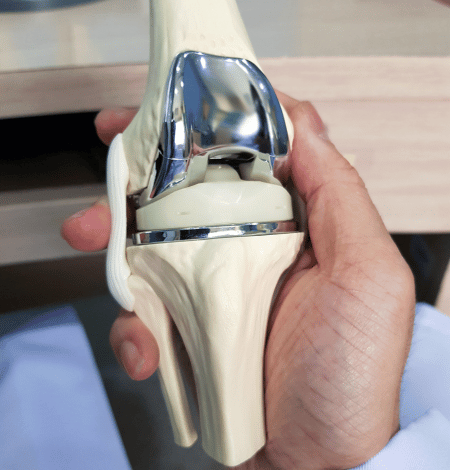Reclaim Lost Mobility And Happiness
With Expert Knee Pain Management
About Us
An Integral Part of Parvathy Hospital
Parvathy Knee Institute, led by Dr Vetri Kumar and Dr Muthukumar, is a leading orthopedic center specializing in exceptional care for knee and joint problems. Our patient-centric approach ensures that we focus on helping each patient regain their mobility, reduce pain, and improve their overall quality of life.

DR. VETRI KUMAR. M.K
MBBS, MS Ortho
Consultant Knee Preservation & Joint replacement Surgeon
Services
Treatments We Offer To Improve The Quality Of Life
Joint Preservation
Joint preservation focuses on interventions to maintain and protect joint health, preventing or delaying the progression of musculoskeletal disorders. Emphasizing non-surgical approaches, it aims to optimize function and longevity.
Patellofemoral
Patellofemoral refers to the joint between the patella (kneecap) and femur (thigh bone). It plays a crucial role in knee movement and stability, often associated with conditions like patellofemoral pain syndrome
USG guided Injections
USG-guided knee injections involve precise delivery of medication or anesthesia into the joint using ultrasound technology. This minimally invasive procedure enhances accuracy and effectiveness for targeted pain relief and improved joint function.
Unicompartmental Knee Arthroplasty (UKA)
Unicompartmental Knee Arthroplasty (UKA) helps to replace the damaged part of the knee joint, preserving healthy tissue. It offers targeted relief and quicker recovery.
TKA- KA
Total Knee Arthroplasty (TKA), also known as knee replacement surgery, is a medical procedure that involves replacing damaged knee joints with artificial implants, alleviating pain and improving mobility.
Revision TKA
Revision Total Knee Arthroplasty (TKA) is done to replace a previously implanted knee joint prosthesis that may have worn out or encountered complications, restoring functionality and relieving pain.
RF Ablation
Radiofrequency (RF) ablation in the knee is done using radiofrequency energy to target and alleviate pain originating from nerve tissues, providing effective relief for chronic knee conditions.
Day Care Knee Replacement
Often referred as Same Day Surgery, Daycare knee replacement surgery is a minimally invasive procedure where an artificial knee joint is implanted without the patient staying in the hospital overnight.
Bilateral knee replacement
Bilateral knee replacement involves surgically replacing both knee joints with artificial implants, typically performed to alleviate pain and restore mobility in individuals suffering from severe arthritis or joint damage.
Infrastructure
Holistic Space with State of Art Technology
At Knee Institute, We offer a range of services, including knee replacement surgery, knee arthroscopy, and non-surgical treatments, and use state-of-the-art technologies and techniques to deliver exceptional results.
Your surgery
Swift Recovery Program
Our Swift Recovery Program represents a paradigm shift in traditional care, incorporating the latest research evidence to expedite and enhance the recovery process following your operation. Our goal is to ensure a prompt and safe recovery, with an emphasis on early discharge and appropriate follow-up care. This approach not only improves patient satisfaction but also reduces the risk of infections and thromboembolism.
Key features of our enhanced recovery program include:
- Advanced Surgical and Anesthetic Techniques: We employ cutting-edge surgical and anesthetic techniques designed to facilitate early mobility, contributing to a quicker recovery.
- Multimodal Postoperative Pain Management: Our program includes an excellent multi-modal approach to post-operative pain treatment. This not only ensures early patient mobilization but also minimizes the side effects of medications.
- Post-operative Self-Physiotherapy: Empowering our patients, our program encourages post-operative self-physiotherapy. This proactive approach fosters personal engagement in the recovery process, aiding in a faster return to normal activities.
If you are considering day case surgery, we invite you to discuss this option with Dr Vetri and his Anesthetist to determine your eligibility. Our Swift Recovery Program is designed to provide you with the best possible care, ensuring a swift and successful recovery.

Before Surgery
For patients experiencing significant discomfort, we strive to accommodate your needs by offering expedited surgery dates, minimizing the duration of your pain. While many individuals may need to coordinate with family or secure time off from work, we generally schedule surgeries within a timeframe of 2-3 months. Importantly, there is no pressure to undergo surgery until you personally feel prepared. Your comfort and readiness are paramount in our approach to scheduling and conducting procedures.
For self-funded patients, the Knee Institute will furnish you with a detailed written quotation.
If you are covered by private insurance, your fees may be fully or partially covered by your private health fund. We recommend reaching out to your private insurer for additional information and clarification on your coverage.
Prior to consenting to surgery, it is crucial to be well-informed about its associated risks. A comprehensive description of the potential risks related to joint replacement can be found with the admin of the Knee Institute. Once you have thoroughly understood the potential complications and we have addressed any inquiries you may have, the next step is to complete and sign a consent form.
This form grants authorization for Dr Vetri to proceed with the surgery. Your thorough understanding and voluntary consent are paramount in this process.
Dr Vetri collaborates closely with a select group of highly skilled anesthetists to ensure optimal pain relief and a smooth recovery post-surgery. The specific anesthetist assigned to your surgery is contingent upon the scheduled day of the procedure. Typically, the anesthetist will reach out to you in advance to discuss the details of your anesthesia. Feel free to inquire about obtaining a quotation for their services during this consultation. Open communication with the anesthetist contributes to a well-informed and comfortable experience throughout the surgical process.
Address tooth decay and mouth infections before joint replacement surgery by consulting your dentist. Infections in the mouth can impact other body parts. Even post-surgery, remain vigilant about oral and general health.
Before your surgery, essential tests including a chest x-ray, ECG, and blood tests are required, and these are standard for all patients. Typically, these tests are conducted two weeks before your pre-admission appointment. You have the option to undergo these investigations at The Parvathy Hospital, or at a convenient pathology location. It is crucial that the results are available in time for your pre-admission appointment. Please ensure timely completion for a smooth pre-surgery assessment.
A few weeks before your scheduled surgery, The Parvathy Hospital will reach out to arrange an appointment for you at The Knee Institute. During this session, a comprehensive assessment will be conducted, providing you with all the necessary details about your hospital stay and procedure. If needed, a general practitioner can be present at this appointment. Your chest x-ray, ECG, and blood pathology results will be discussed with you, and there is a possibility that your anesthetist may visit during the pre-admission assessment.
Before your surgery, we'll discuss your medications and provide important instructions. If unsure, contact our office. Complex medical cases may require appointments with specialists, and we'll inform you if needed.
Specific guidelines:
- Aspirin: Continue baby aspirin (81mg), but stop full-dose (325mg) aspirin one week before surgery.
- Notify us about anticoagulants, immunosuppressive medications.
- Stop anti-inflammatory meds (Voltaren, ibuprofen, aspirin) 10 days before surgery, unless approved by a hematologist or cardiologist.
- Homeopathic remedies like Arnica can be taken to reduce bruising.
After Surgery
Planning for the recovery period after hospital discharge is crucial. During the initial weeks following surgery, reduced mobility and energy levels are expected. It may take two to three months to return to pre-operative energy levels. Assistance with tasks like washing, dressing (especially shoes and socks), cooking, and shopping may be necessary.
If you lack available support, consider arranging for home help or staying in a rehabilitation facility for a couple of weeks—we can offer guidance on these options.
Most joint replacement patients will benefit from a grabber for reaching and picking up items from the floor, and some may require crutches (bring your own to avoid extra charges). If your home environment poses challenges postoperatively, the assistance of an occupational therapist can be valuable.
Rehabilitation centers play a crucial role in facilitating recovery, providing patients with customized physiotherapy, hydrotherapy, and occupational therapy sessions that instill confidence for a successful return home.
If you prefer discharge to a rehabilitation center, Dr Vetri' team will recommend reputable and high-quality facilities to support your recovery journey.
For each appointment, it's essential to have new X-rays done. If your appointment is at The Knee Institute, you can conveniently schedule your X-rays at Lister Imaging just before your meeting with Dr Vetri.
The initial follow-up, occurring six weeks post-surgery, is crucial. Dr Vetri will assess your X-rays, wound, and the range of motion in the operated joint. This is a significant consultation as most complications arise in the initial weeks following a joint replacement
Subsequent follow-up appointments, even when you aren't facing issues, play a vital role. These sessions offer an opportunity to proactively screen for complications before they manifest symptoms, addressing concerns before they become problematic.
Following your surgery, you will be instructed in safe and effective self-physiotherapy techniques tailored to your joint. Access post-operative physio recommendations by our physiotherapists.
Regarding sports, swimming is an excellent exercise for expedited recovery. However, high-impact activities like running, tennis, and squash should be avoided until 4 to 6 months post-operation to allow the bone to strengthen around the implant.
To enhance your post-surgery comfort, Dr Vetri employs a skin closure technique that requires no specific care. Sutures under the skin will naturally dissolve, and the medical super-glue on the skin incision will peel off over the next 2 – 4 weeks. This means no drains, sutures, or staples need to be removed.
Post-surgery, your wound may not require a dressing, as it is made waterproof by a specialized medical glue acting as a dressing. No additional nurse care is needed. You can confidently take a shower the day after surgery without needing to protect the wound, but refrain from submerging it in water (no baths) for six weeks.
It's typical to experience a small blood collection (hematoma) or swelling around the operated joint. This will gradually move downward towards the ankle, and the swelling will naturally be reabsorbed over a period of 1 to 2 months.
Antibiotics are advisable for all patients with a joint replacement throughout the lifespan of the implant during dental procedures such as cleaning, extraction, root canal, or filling.
Additionally, for other procedures involving skin penetration or testing related to the gastrointestinal and genitourinary tract, preventative antibiotics are recommended. It is important to inform any physician about your joint replacement procedure during medical visits.
1. Return to Work: Patients typically resume work between 4 to 12 weeks after surgery. The decision to return is based on individual progress, specific work requirements, and personal choice.
2. Resuming Sports Activities: The timeline for resuming sports activities varies among patients. For hip and knee replacements, low-impact activities like swimming, biking, golf, hiking, and other similar sports can be resumed between 6 and 12 weeks post-surgery. Golf enthusiasts can engage in putting and pitching after 4 weeks, with a full swing authorized at 3 months.
1. For Right Leg Surgeries: Driving is generally deferred for up to 6 weeks after surgery if it was performed on the right leg. However, patients progressing rapidly, off pain medications, and using minimal assistive devices may qualify for an earlier "driving test" (brake response test) before the 6-week mark.
2. For Left Leg Surgeries: Patients who underwent surgery on the left leg can resume driving when they are comfortable with pain management, no longer reliant on a walker or crutches, and feel safe and at ease behind the wheel.








